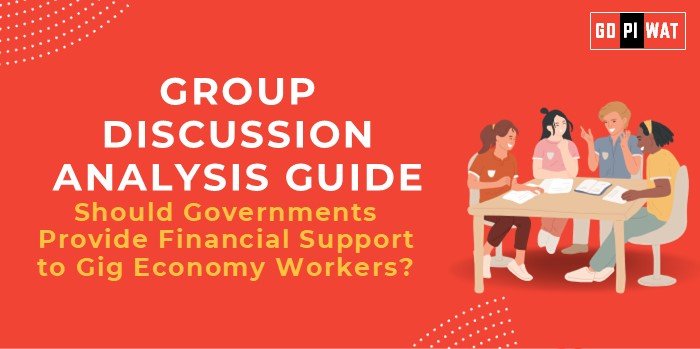📋 Group Discussion (GD) Analysis Guide
🌍 Topic: Should Governments Provide Financial Support to Gig Economy Workers?
🌐 Introduction to Financial Support for Gig Economy Workers
“The gig economy, characterized by flexible and on-demand work arrangements, has emerged as a significant employment sector, yet its workers often face income instability and lack access to social security. As this sector grows, debates about government intervention and support are intensifying.”
With 15% of the global workforce engaged in gig work, including platforms like Uber, Zomato, and TaskRabbit, this sector provides economic opportunities but also exposes workers to vulnerabilities like wage fluctuations, lack of benefits, and inadequate legal protections. The COVID-19 pandemic amplified these challenges, bringing the discussion of financial support into sharp focus.
📊 Quick Facts and Key Statistics
- Global Gig Workforce: 15% of the workforce is engaged in gig work (ILO, 2023).
- Income Instability: 60% of gig workers report fluctuating monthly incomes (PwC, 2023).
- Social Security Gap: 80% of gig workers lack access to traditional employment benefits (ILO, 2023).
- Economic Contribution: The gig economy is projected to contribute $455 billion globally by 2025 (World Bank, 2023).
👥 Stakeholders and Their Roles
- Governments: Formulate policies, provide financial aid, and regulate platforms to ensure fair practices.
- Gig Platforms: Offer minimum wage guarantees, insurance, and job stability for workers.
- Workers: Advocate for rights, organize for collective bargaining, and utilize government schemes.
- Consumers: Play an indirect role by supporting ethical gig platforms.
🏆 Achievements and Challenges
✨ Achievements:
- Income Opportunities: Gig platforms provide jobs to individuals otherwise excluded from traditional employment.
- Economic Flexibility: Workers can manage schedules and pursue multiple income sources.
- Regional Examples:
- In India, platforms like Swiggy introduced accidental insurance for gig workers.
- California passed Assembly Bill 5, classifying many gig workers as employees with benefits.
⚠️ Challenges:
- Lack of Benefits: No access to pensions, healthcare, or paid leave.
- Earnings Volatility: Payments often fluctuate based on demand and platform policies.
- Global Comparisons: While Denmark ensures social security for gig workers, the US struggles with policy inconsistencies.
🛠️ Structured Arguments for Discussion
- Supporting Stance: “Financial support for gig workers can promote economic stability and encourage fair treatment in an evolving labor market.”
- Opposing Stance: “Providing financial support may reduce competitiveness in the gig economy and burden taxpayers unnecessarily.”
- Balanced Perspective: “A middle ground can be found by incentivizing platforms to provide benefits while governments offer targeted support during crises.”
💡 Effective Discussion Approaches
- Opening Approaches:
- Statistical Highlight: “With 80% of gig workers lacking benefits, government intervention is crucial to address this gap.”
- Historical Context: “The rise of the gig economy echoes the industrial revolution, demanding a modern safety net for its workers.”
- Counter-Argument Handling:
- Counterpoint: “While government support could increase public spending, it can also reduce long-term costs associated with unemployment and poverty.”
- Data-backed Rebuttal: “Denmark’s social safety net for gig workers has resulted in higher productivity and worker satisfaction.”
📊 Strategic Analysis of Strengths and Weaknesses
- Strengths: Flexible employment opportunities, global connectivity, and reduced unemployment.
- Weaknesses: Lack of regulation, income volatility, and minimal social protections.
- Opportunities: Partner with platforms to create shared responsibility models for benefits.
- Threats: Overregulation risks discouraging innovation and investment in the gig sector.
📚 Connecting with B-School Applications
- Real-World Applications: This topic aligns with case studies in labor economics, corporate responsibility, and public-private partnerships.
- Sample Interview Questions:
- “How can governments balance support for gig workers without stifling innovation?”
- “Should platforms share the responsibility for worker benefits with governments?”
- Insights for B-School Students:
- Study hybrid economic models for public-private collaboration in worker welfare.
- Analyze global best practices in gig worker support for policy suggestions.


